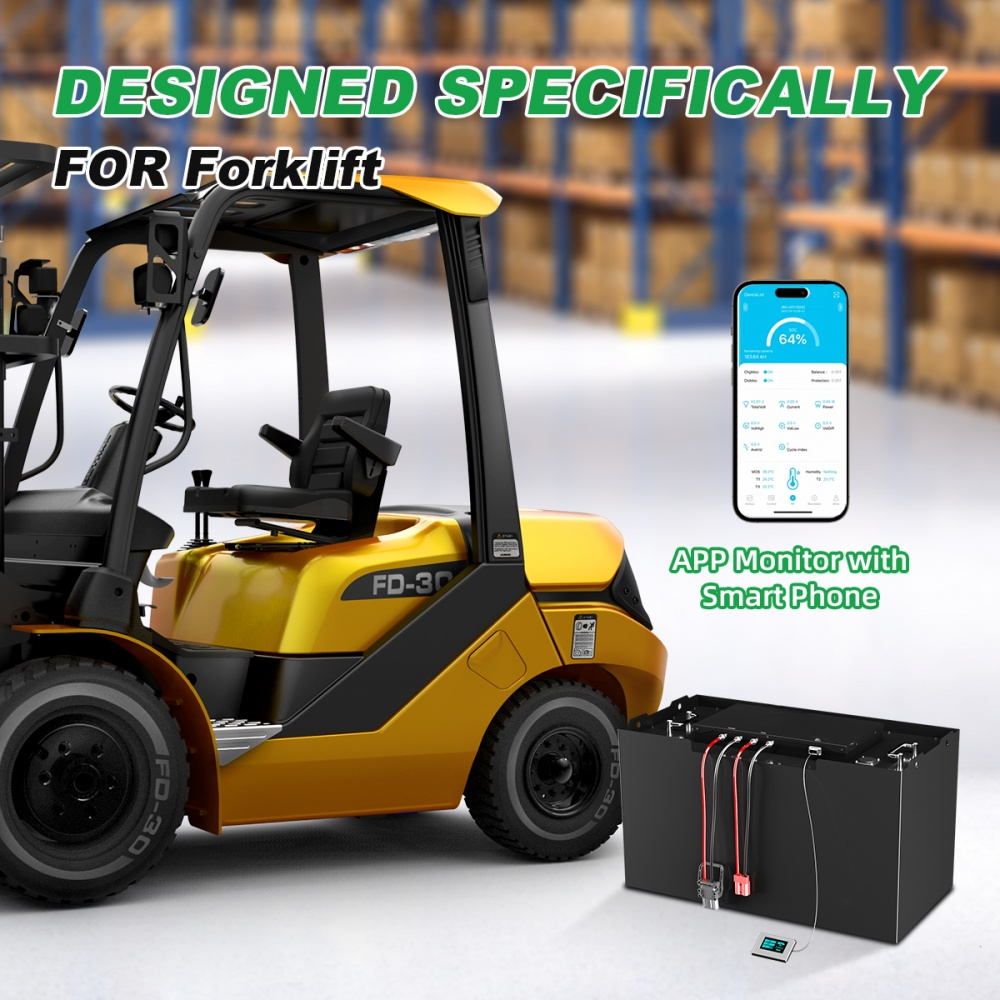Why Forklift Battery Recharge Times Are Critical for Your Warehouse
For warehouse managers, logistics coordinators, and industrial operators, forklifts keep operations moving. The time it takes to recharge a forklift battery—known as forklift battery recharge time—can make or break your productivity. A fast, efficient recharge process means less downtime, fewer delays, and lower costs, keeping your warehouse or facility running smoothly.
Picture a logistics center where forklifts are sidelined for hours, waiting for batteries to charge. Orders pile up, deadlines are missed, and expenses climb. A quick forklift battery recharge can solve this. Lithium-ion batteries, for instance, charge in 1–2 hours, compared to 6–8 hours for lead-acid batteries, making them perfect for round-the-clock operations. But recharge times vary based on battery type, capacity, charger power, and how you use your forklifts.
A slow or poorly managed recharge process can lead to costly downtime, higher energy bills, or worn-out batteries. This guide explains forklift battery recharge times in plain language, comparing lead-acid and lithium-ion options, outlining factors that affect charging, and sharing practical tips for warehouse professionals. We’ll also include real customer stories to show how faster recharges boost efficiency. Yibai Lityum Teknolojisi offers lithium-ion batteries designed for rapid forklift battery recharge, tailored to your needs. Ready to streamline your operations? Bize ulaşın at Contact Us for a quote!
Lead-Acid vs. Lithium-Ion: How Recharge Times Compare
The type of forklift battery you use determines how long a forklift battery recharge takes. Here’s how lead-acid and lithium-ion batteries stack up:
Lead-Acid Batteries:
Recharge Time: 6–8 hours for a full charge, plus 8–12 hours of cooling to avoid overheating.
Charging Process: Must complete a full charge cycle; partial charges (opportunity charging) can damage the battery.
Challenges: Long recharge and cooling times cause downtime, especially for multi-shift warehouses. Lifespan is shorter (1000–1500 cycles, or 3–5 years).
Best For: Single-shift operations with overnight charging availability.
Lithium-Ion Batteries:
Recharge Time: 1–2 hours for a full charge, with no cooling needed.
Charging Process: Support opportunity charging, allowing quick top-ups during breaks without harming the battery.
Benefits: Fast charging and long lifespan (3000–5000 cycles, or 8–10 years) minimize downtime and replacements. Perform well in cold storage or high-demand settings.
Best For: Multi-shift warehouses, logistics hubs, or cold storage facilities.
A warehouse with lead-acid batteries loses 8 hours daily to charging, while lithium-ion batteries keep forklifts active with 20-minute opportunity charges during breaks. Lithium-ion batteries are ideal for busy operations needing fast forklift battery recharge. To explore lithium-ion options, visit Contact Us.
Factors That Impact Forklift Battery Recharge Time
Several factors affect how long a forklift battery recharge takes. Understanding these helps warehouse managers optimize charging and keep forklifts running.
Battery Type and Chemistry
Lithium-ion batteries recharge in 1–2 hours, thanks to their high energy density and efficient chemistry, which allows rapid charging without overheating. Lead-acid batteries, however, take 6–8 hours due to slower chemical reactions and the need for controlled charging to prevent damage.
Battery Capacity (Ampere-Hours)
Larger batteries take longer to recharge:
Small Capacity (200–400 Ah): 1–1.5 hours for lithium-ion, 6–7 hours for lead-acid.
Medium Capacity (400–800 Ah): 1.5–2 hours for lithium-ion, 7–8 hours for lead-acid.
Large Capacity (800–1200 Ah): 2–2.5 hours for lithium-ion, 8–9 hours for lead-acid.
For example, a 48V, 600 Ah lithium-ion battery recharges in 1.5 hours, perfect for multi-shift logistics. Choose a capacity that balances runtime and recharge speed for your operation.
Charger Power and Compatibility
The charger’s output (in amps) determines recharge speed:
Low-Power Chargers (20–50A): Common for lead-acid or small lithium-ion batteries, but slower (e.g., 6–8 hours for 600 Ah).
High-Power Chargers (100–200A): Built for lithium-ion batteries, charging 600 Ah in 1–2 hours.
Smart Chargers: Adjust current to optimize speed and protect battery health, especially for lithium-ion.
Ensure the charger matches the battery’s voltage (24V, 48V, etc.) and chemistry. High-power chargers are key for fast forklift battery recharge in busy warehouses.
Depth of Discharge (DoD)
The battery’s charge level before recharging affects time:
Shallow Discharge (20–40%): Quick recharge (e.g., 30–60 minutes for lithium-ion).
Deep Discharge (80–100%): Full recharge needed (e.g., 1.5–2 hours for lithium-ion, 6–8 hours for lead-acid).
Lithium-ion batteries allow opportunity charging at any DoD without damage, unlike lead-acid. A 50% discharged lithium-ion battery can recharge in 45 minutes, keeping forklifts active.
Environmental Conditions
Temperature impacts charging:
Cold Environments (0°C to -20°C): Slows reactions, increasing recharge time by 10–20%. Lithium-ion outperforms lead-acid in cold storage.
Hot Environments (30°C+): May require slower charging to avoid overheating, especially for lead-acid.
Batteries with thermal management ensure consistent forklift battery recharge in extreme conditions.
Battery Age and Health
Older or degraded batteries charge slower:
Kurşun-Asit: Sulfation reduces capacity, extending recharge time.
Lithium-Ion: Maintains efficiency longer but may slow slightly after 4000 cycles.
Regular maintenance (for lead-acid) or Battery Management System (BMS) monitoring (for lithium-ion) keeps charging efficient. For tailored battery solutions, reach out at Contact Us.
Best Practices to Minimize Forklift Battery Recharge Time
To reduce forklift battery recharge time and boost warehouse efficiency, follow these practical tips:
Opt for Lithium-Ion Batteries: Their 1–2-hour recharge and opportunity charging are ideal for high-demand operations.
Invest in High-Power Chargers: Use 100–200A chargers for lithium-ion batteries to slash recharge time. Ensure compatibility with battery voltage and chemistry.
Use Opportunity Charging: Recharge lithium-ion batteries during breaks (15–30 minutes) to maintain uptime without full cycles.
Avoid Deep Discharges: Charge lithium-ion batteries at 20–50% DoD to speed up recharges and extend lifespan.
Control Charging Environment: Store and charge batteries in 10–25°C conditions when possible. Use insulated chargers in cold storage.
Plan Charging Schedules: Charge during low-demand periods (e.g., lunch breaks) to minimize workflow disruptions.
Monitor Battery Health: Inspect lead-acid batteries for sulfation or leaks; use BMS diagnostics for lithium-ion to ensure optimal charging.
Train Operators: Teach staff proper charging habits to maximize battery life and recharge efficiency.
Örnek: A logistics hub using lithium-ion batteries with opportunity charging during breaks achieves 95% uptime, compared to 80% with lead-acid. For charging solutions, visit Contact Us.
Müşteri Başarı Hikayeleri
Multi-Shift Logistics Hub
“Our Atlanta logistics hub operates three shifts, and lead-acid batteries meant hours of downtime for charging. Switching to Yibai Lithium Technology’s 48V, 600 Ah lithium-ion batteries with a 1.5-hour forklift battery recharge changed everything. Opportunity charging during breaks keeps our forklifts moving, increasing output by 25% and saving $16,000 yearly on energy and maintenance. The batteries’ BMS ensures safe, fast charging, and the team customized them for our Linde forklifts. Their support made the switch seamless. For high-paced logistics, these lithium-ion batteries are a game-changer for forklift battery recharge speed!”
— Rachel P., Logistics Coordinator, Atlanta Freight Solutions
Heavy Manufacturing Plant
“Our Indiana plant uses 80V forklifts to move heavy machinery parts, and lead-acid batteries slowed us down with 8-hour recharges. Yibai Lithium Technology’s 80V, 800 Ah lithium-ion batteries with a 2-hour forklift battery recharge eliminated delays. Opportunity charging during shift changes keeps production on track, cutting downtime by 30% and saving $20,000 annually. The IP54-rated batteries handle our dusty environment, and the team ensured compatibility with our Komatsu forklifts. Their 7-year warranty is a bonus. For manufacturing, these batteries deliver fast forklift battery recharge and reliability!”
— Steven M., Plant Manager, Indiana Heavy Manufacturing
Soğuk Hava Deposu
“Our Winnipeg cold storage warehouse operates at -18°C, and lead-acid batteries struggled with long recharges in the cold. Yibai Lithium Technology’s 36V, 400 Ah lithium-ion batteries with IP65 rating and 1.5-hour forklift battery recharge transformed our workflow. They charge reliably in freezing conditions, boosting uptime by 28% and saving $14,000 yearly on energy costs. The team customized the batteries for our Jungheinrich forklifts and shared cold-weather charging tips. For cold storage, these batteries offer the fastest forklift battery recharge available!”
— Chloe W., Warehouse Manager, Winnipeg Frost Logistics
Why Fast Forklift Battery Recharge Matters
A fast forklift battery recharge process is a game-changer for warehouse and industrial operations. Lithium-ion batteries, with 1–2-hour recharges and opportunity charging, keep forklifts running longer than lead-acid batteries, which need 6–8 hours plus cooling. This speed translates to:
Less Downtime: Opportunity charging during breaks ensures near-continuous operation.
Lower Costs: Faster recharges reduce energy bills and labor for battery swaps.
Higher Productivity: More uptime means faster order fulfillment and happier customers.
For example, a warehouse switching to lithium-ion batteries can save $15,000 annually by cutting downtime and maintenance. Factors like charger power, battery capacity, and temperature management further optimize recharge time. By choosing the right battery and charger, you can streamline your operations. For expert advice on fast-charging batteries, reach out at info@yibaienergy-china.com.
FAQs About Forklift Battery Recharge Times
İşte sık sorulan soruların cevapları forklift battery recharge times, helping warehouse managers and logistics coordinators optimize their fleets.
How long does a lithium-ion forklift battery take to recharge?
Typically 1–2 hours for a full charge, with opportunity charging in 15–30 minutes.
What’s the recharge time for a lead-acid forklift battery?
6–8 hours, plus 8–12 hours of cooling, requiring a full charge cycle.
Can I recharge a lithium-ion battery during short breaks?
Yes, opportunity charging extends runtime without damaging the battery.
How do cold temperatures affect forklift battery recharge?
Cold slows charging by 10–20%, but lithium-ion batteries perform better than lead-acid.
How can I speed up forklift battery recharge times?
Use lithium-ion batteries and high-power chargers. Contact us for tailored solutions.
Power Your Fleet with Fast Forklift Battery Recharge
Fast forklift battery recharge times are essential for keeping warehouses and industrial facilities efficient. Lithium-ion batteries, with 1–2-hour recharges and opportunity charging, outperform lead-acid batteries, reducing downtime and costs. By understanding factors like battery capacity, charger power, and temperature, and adopting best practices, you can optimize your fleet’s performance. Yibai Lithium Technology offers lithium-ion batteries designed for rapid forklift battery recharge, backed by industry certifications and 5–7-year warranties. Bize ulaşın today to request a quote and keep your operations powered!

